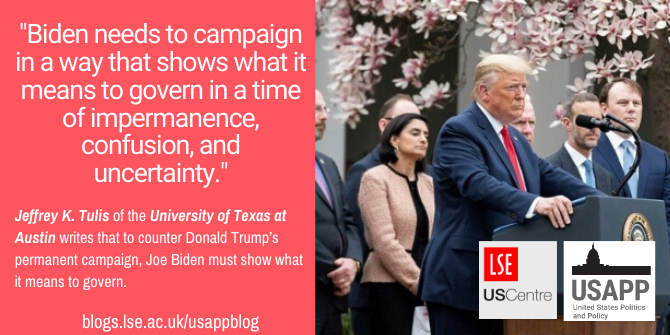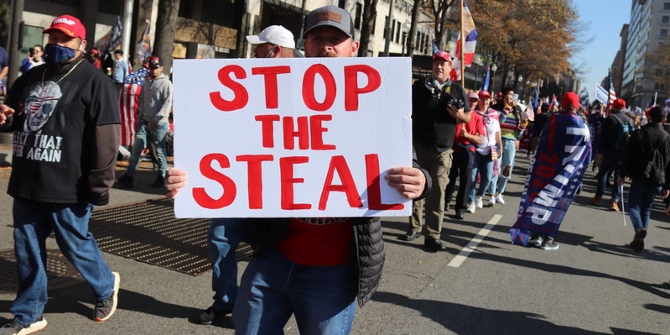 Trump’s ‘permanent campaign’ mentality has affected the nation’s crisis response. Jeffrey K. Tulis argues that the presumptive Democratic nominee, Joe Biden, must seek ways to look presidential while campaigning from home.
Trump’s ‘permanent campaign’ mentality has affected the nation’s crisis response. Jeffrey K. Tulis argues that the presumptive Democratic nominee, Joe Biden, must seek ways to look presidential while campaigning from home.
The “permanent campaign” was the title of a 1980 book by journalist and later adviser to Bill Clinton, Sidney Blumenthal. It captured the central role that experts in electoral politics had come to play in governing, not just in elections. Over the course of the twentieth century, presidents increasingly blended the activities of campaigning and governing. Pollsters and election consultants were brought into the White House. They developed strategies to persuade the public of the president’s preferred policies, but much more importantly they helped shape public policies themselves. This phenomenon is among the important background conditions that made the Trump presidency possible.
Sometimes a change in degree can be so great that it becomes a change in kind. Before Trump, the “permanent campaign” rubric actually did not describe all of the day-to-day activities of presidents. While presidents used campaign techniques as instruments of governance far more than did their nineteenth-century counterparts, they did not in fact see the political world from solely a campaigner’s perspective. Modern presidents toggled between the activities of campaigning for re-election and governing, sometimes adopting what came to be known as a Rose Garden strategy—the idea that being seen performing the duties of the office, solving important problems or mitigating crises, would better reinforce the public perception of their suitability for the presidency than being seen overtly catering to the needs of popular approval.
The Cuban Missile Crisis, the Challenger shuttle disaster, the 9/11 attacks, and other moments of national trauma have been occasions in which the country instinctively came together. Polling usually shows bipartisan support for presidents during times like these, because the vast majority of our citizens want presidents to succeed no matter what they think of their president during normal times. It was thus no surprise that President Trump received the highest approval ratings of his term in the early weeks of the pandemic. Previous presidents understood that attending to—and being seen to be attending to—their duties in times of emergency is vital to maintaining political support. In emergencies, presidents who attend to the core tasks of governing gain far more support from the public than they could obtain by campaigning for it. For reasons of political interest as well as the common good, normal presidents know that the most important task they have is to govern, not to campaign.
In such circumstances, partisan opponents—mindful of their own duties—tend to support the president even if the president pursues a policy or strategy with which they disagree. Partisan assessment can come later, after the actions required are taken or the crisis has passed.
Trump does not govern, he campaigns
Donald Trump is not a normal president. For him, there is no toggle switch between campaigning and governing. On the very day of his inauguration, he filed the paperwork for his 2020 re-election campaign. Less than a month later, he began holding campaign-style rallies again. Shortly before the first of those rallies, in February 2017, he told reporters aboard Air Force One, “Life is a campaign, Making our country great again is a campaign. For me, it’s a campaign; to make America great again is absolutely a campaign.”
Before his unexpected win in 2016, Trump’s only clear success in life had been his reality TV show. He had never held any political office. He had never served in the military. His businesses repeatedly went bankrupt. So when he took office, the main experiential resources he had for exercising power and holding office were his time on the reality TV show and the tactics of his campaign. Few pundits and professionals thought Trump would win in 2016 because he said so many outrageous things so often—any one of which would have sunk the campaigns of other candidates. Trump pushed the techniques of campaigning to Orwellian dimensions. He routinely lied; he repeated lies often, and he projected his vices onto his opponents. This set of tactics—repetition, proliferation, and projection—worked so well in the campaign that it became his template for governance.

“President Trump Holds a News Conference on the Coronavirus” by The White House is Public Domain.
Thus, it was no surprise, though it was contemptible, that Trump traveled to the Cenre for Disease Control at the outset of the pandemic wearing one of his red re-election-campaign “Keep America Great” hats. It is no surprise, though it is contemptible, that Trump sees press briefings on the pandemic as substitutes for partisan rallies. It is no surprise, though it is contemptible, that Trump markets harmful “cures” for COVID-19, just as he would trade in fiction and lies during the course of his typical campaign rallies.
Before the pandemic, citizens who supported Trump were either duped by his Orwellian innovations or they understood them but didn’t care because he was advancing policies they liked: favored judges, tax benefits, or a vision of the nation that channeled their own grievances or advanced their own interests. Many people either were enveloped in, or tolerated, the fictional world that Trump creates and inhabits.
But in a crisis, citizens tend to judge presidents by the real-world effects that government decisions have on their own lives or on the lives of people they know. In the present pandemic, millions of Americans have relatives who have been sick or who have died, or have friends who have suffered. They have seen the news reports of nursing homes stacking bodies. Of emergency rooms with long lines. Of small businesses on the brink of ruin. They can see and feel the effects of government action and inaction. This is why Trump has not and will not get traction, as he has in the past, for his falsehoods and fictions. Everyone wants a president who attends to the duties of governing today, not one who hijacks the mechanisms of governing for a permanent campaign.
Many observers have remarked how difficult it must be for former Vice President and presumptive Democratic presidential nominee, Joe Biden, to be confined to his basement and unable to campaign in this electoral season. Biden also currently holds no elected office, so unlike, for example, New York State Governor Andrew Cuomo he can’t literally demonstrate his own ability to govern now.
Nevertheless, if President Trump shows every day that he is incapable of governing because he is in a permanent campaign, Joe Biden needs to illustrate and exemplify what leadership could look like if we had a president who understood the office and its duties. Biden needs to display the kind of government we need but do not have.
The best way to do this would be to exemplify the leader that we don’t now have.
How Joe Biden can show himself to be the leader the US needs
There are two ways to do this: revive the statesmanship style that preceded the rise of the permanent campaign, and develop a new norm for campaigns today.
To revive the statesmanship of the past, Biden needs to get journalists and citizens to better attend to his very impressive written rhetoric. Whatever Biden’s limitations as a speaker, his recent written rhetoric has been truly superb—setting a new standard for leadership. Unfortunately, because ours is now an oral and visual culture, this rhetoric has been largely unnoticed. For example, Biden’s official statement responding to Bernie Sanders suspending his campaign is truly remarkable. Progressives who are hesitating to endorse Biden, as Sanders himself has done, need to read that statement. In it, Biden commits to the same goals as Sanders and testifies to the extent to which Sanders has shaped the Democratic party. Biden graciously concedes that Sanders is correct in claiming that he has won the ideological battle for the soul of a new party.
In this statement, Biden harks back to the nineteenth century in emphasizing goals over policies. It is important for candidates to illustrate their policy agenda with specific policies. But it is wrong to think that leadership is the ability to ram through specific policies once elected. Forming a governing majority is about gaining support for an attractive public philosophy—it is not promising non-negotiable commitments to very specific policies. Such a view of leadership—the specific policy view—is anti-constitutional to the extent that it supplants the role of Congress in actually legislating. Leadership is, rather, the setting of an agenda and of the basic terms of debate.
The Biden campaign should prominently feature his gracious statement to the Sanders campaign, and other similarly well-crafted statements, on its website. And they should make a point of promoting it to journalists and partisans. Carefully written rhetoric is a way to discipline a campaign and exemplify governing dispositions and leadership at the same time. Surrogates could walk journalists though carefully constructed texts rather than offer simplistic talking points on the fly.
If the Biden campaign should look back to nineteenth century statesmen for models of written rhetoric that lasts and informs, it should also look forward by introducing a new model for campaigning. Instead of waiting for a transition between the election and inauguration to roll out nominees for cabinet posts, Biden should follow his VP choice with a rollout of cabinet nominees over the next couple of months. The entire rollout would form a kind of shadow government. It would show Americans what a good government would look like. Each proposed nominee could enable Biden to gain some control over the news cycle. Biden could also use the rollout to advance whatever vision of leadership he believes necessary at this time—whether it be a full-throated commitment to a progressive Democratic party or a more capacious party with progressive and moderate elements.
Because Trump sees governing as a permanent campaign, Biden needs to campaign in a way that shows what it means to govern in a time of impermanence, confusion, and uncertainty. He can do this while actually supporting the Trump administration if it makes difficult decisions to manage the pandemic; he can avoid responding to most of Trump’s provocations.
As circumstances permit, the Biden campaign can put their candidate in conversation with citizens and health providers who are suffering, allowing him to show his instinctive empathy and to thank them on behalf of a grateful nation. This, too, would be a striking contrast with Trump and it would exemplify an expectation we have for those who hold the office of president.
Ignoring Trump to the greatest extent possible while illustrating what a real president looks like, Biden can lead now.
Please read our comments policy before commenting.
Note: This article gives the views of the authors, and not the position of USAPP – American Politics and Policy, nor the London School of Economics.
Shortened URL for this post: https://bit.ly/35puH8Z
About the author
 Jeffrey K. Tulis – University of Texas at Austin
Jeffrey K. Tulis – University of Texas at Austin
Jeffrey K. Tulis is Professor of Government at The University of Texas at Austin, author of The Rhetorical Presidency, and co-author of Legacies of Losing in American Politics.







One important point that you left out – in times of crises, Americans gather together and support the President. Just look at Bush2, where he was in the polls in August 2001 and then a month after 9/11. The fact that Trump is ONLY at 49% really is quite damning. We can only hope….